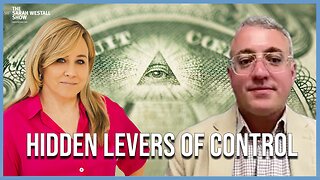Premium Only Content

Bill Cooper #1
see and searchhttps://rumble.com/v35qd1w-g.-edward-griffin-on-the-rothschilds-cbdc-and-the-new-world-order-and-how-t.html TRUTH.
William "Bill" Cooper made a wide range of predictions and observations in his book "Behold a Pale Horse" and in his other talks. Some of these have been viewed, especially by his proponents, as eerily prescient, while others have been more controversial.
Let's look at a few predictions or observations that might be viewed as having some element of foresight:
Microchipping of Humans: Cooper discussed the idea of microchipping humans. While this was in the context of conspiracy theories related to government control, the idea of microchips being used in humans (for medical or other practical purposes) is a discussion today, with companies exploring the technology.
Increased Surveillance: Cooper often talked about the government's desire for increased surveillance on citizens. Today, with the proliferation of technologies and capabilities like facial recognition, widespread electronic data collection, and mass surveillance tools, some might see his warnings as having been on the mark.
The Rise of a Police State: Cooper warned about the increased militarization of the police and a growing police state in the U.S. In the past few decades, the debate around police militarization and civil liberties has become more pronounced, especially with events like the responses to protests in various U.S. cities.
The Influence of Secret Societies: While secret societies have been a popular topic for conspiracy theorists for ages, Cooper's discussions about their influence on global events have gained traction in certain circles, especially with the increased speculation on the power and influence of elites in global affairs.
False Flag Operations: Cooper often talked about governments using or even staging events as pretexts for implementing policies, curtailing civil liberties, or going to war. This topic is controversial, but events where intelligence failures or mistakes were used to justify policies or actions have made this a topic of debate.
-
 4:00:33
4:00:33
SynthTrax & DJ Cheezus Livestreams
1 day agoFriday Night Synthwave 80s 90s Electronica and more DJ MIX Livestream Trip-Hop SPECIAL EDITION
55.7K1 -
 4:03:27
4:03:27
FusedAegisTV
12 hours agoRumble Smackdown! #001 Street Fighter 6 $500 Online Tournament
82.6K8 -
 55:58
55:58
BonginoReport
9 hours agoCan Trump Make TikTok Great Again? (Ep. 20) - Nightly Scroll with Hayley Caronia - 04/04/25
154K82 -
 5:09:35
5:09:35
Jorba4
5 hours ago🔴Live-Jorba4- COD WARZONE- VERDANSK FRIDAY. Hot drops W/ XxXAztecWarrior and Lumpy Potato X2
33.4K -
 4:33:11
4:33:11
Nerdrotic
11 hours ago $37.95 earnedPost-Apocalyptic Woke Hollywood, MineCRAP, CinemaCONNED - Friday Night Tights 348, Chris Gore & Rags
128K19 -
 1:00:43
1:00:43
Sarah Westall
8 hours agoThe Greatest Financial Crime in History: How Globalist Central Bankers Did It w/ James Patrick
71.6K3 -
 4:44:07
4:44:07
IamTyrantt
7 hours ago $1.94 earnedTGIF! HIGH ENERGY VIBES!
39K1 -
 13:19
13:19
China Uncensored
9 hours agoHow Trump's New Tariffs Are CRUSHING China's Economy
37.4K18 -
 1:23:47
1:23:47
Kim Iversen
11 hours agoAre Patriots Are Being Deceived? Why Trump and Elon Might Be the Globalists' Greatest Weapons
125K205 -
 1:57:34
1:57:34
vivafrei
12 hours agoCanada: Fentanyl Capital of the World w/ Sam Cooper! Pierre Poilievre Listening to Viva w/ Pleb!
126K92